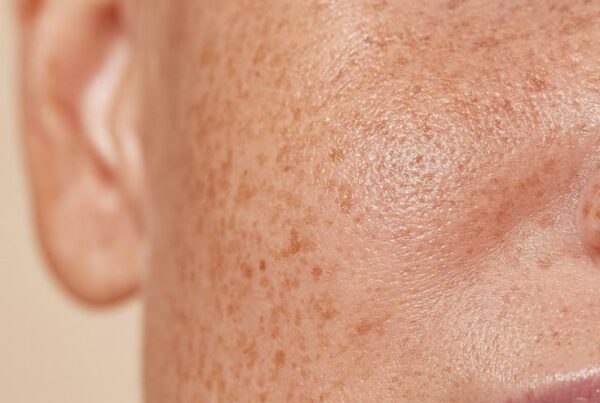We all know that we are what we eat, but when we eat can also make a significant difference in our lives. In recent years, studies have highlighted the benefits of fasting and how it can improve one’s health. Now, since the skin is the largest organ in the body, it makes sense to evaluate how limiting calorie intake for a fixed period of time can affect it.
The link between fasting and skin health
Fasting can trigger metabolic changes in the body that can induce benefits. One of these changes is autophagy, which is the body’s way of clearing out aged and damaged cells in favor of new, strong, and healthy ones. This process comes with a ton of benefits, which include improved brain health and, you guessed, healthier skin.
That said, autophagy isn’t the only way that fasting can help skin health. In fact, the benefits that it has on other parts of the body are also enjoyed by the skin.
1. Prevents dry skin

Marcin Malicki/shutterstock
When you think of blood sugar levels, you likely also think of diabetes. The condition, which affects over 400 million people, can affect your health in various ways, including that of your skin.
High blood sugar levels can cause dry skin and even collagen damage. As collagen helps to maintain the suppleness of the skin, damage to it can cause fine lines and wrinkles to appear.
There are many ways to manage healthy blood sugar levels, one of which is exercising, following a healthy diet, and fasting. According to a study published in the International Journal of Endocrinology, intermittent fasting helped to significantly improve blood sugar levels in patients with disorders of glucose and lipid metabolism.
2. Protects against eczema, psoriasis, acne, and dermatitis.
In most instances, inflammation is a good thing as it helps the body to repair itself. Unfortunately, there are times when inflammation becomes out of control and causes a host of issues. In fact, inflammation is often at the core of many chronic diseases like heart disease and cancer. Inflammation can also cause skin conditions like eczema, psoriasis, acne, and dermatitis.
If you want to mitigate your risk for inflammatory skin conditions, it is important to manage your inflammation from the inside and this can be done with fasting. A study published in Cell found that intermittent fasting caused a reduction in a group of cells called monocytes. According to experts, high levels of monocytes have been associated with inflammation, infection, and other health issues.
3. Healthy gut = healthy skin
The gut is a pretty important part of the body and if it’s not in a good state, then everything (and we do mean everything) falls off balance.

Dexailo/Shutterstock
The gut-skin axis is very serious and if your gut is not in a good state, then you’re likely to deal with skin issues like breakouts, sensitivity, redness, and aging.
So what’s the best way to take care of your gut? Well, you can ensure that it gets enough prebiotics and probiotics, and you can get into the habit of fasting.
“Fasting not only reboots the gut microbiome, which helps [support a balanced inflammatory response] and improve skin health,” explained board-certified dermatologist Keira Barr, M.D. to MindBodyGreen
4. Less stress means fewer skin issues
You may think that you’re handling stress well, but your body will always reveal your secrets. Whether it’s eye bags, skin flare-ups, or breakouts, your skin will always find a way to let you know that your body is struggling.
While no quantitative analysis has been carried out thus far, a meta-analysis found an association between Ramadan (religious fasting) and alleviated feelings of stress, anxiety, and depression.
How long should I fast?
Fasting comes in many different forms, and there is no right answer, as it differs for everyone.
Most people choose to adopt intermittent fasting, also known as 16:8, where you stick to an eight-hour eating window. That said, if you’re fasting for the first time, make sure to take it easy and, preferably, speak to your doctor or dietitian before changing your eating habits.
MAIN IMAGE CREDIT: Gorodenkoff/Shutterstock
Want to know more?
As the world’s population continues to age, researchers are looking for ways in which we can age and still maintain good health. Now, you may associate cutting back calories as part of your weight loss journey. However, studies are showing how cutting calories can slow down aging and increase lifespan.
References
Berthelot, E., Etchecopar-Etchart, D., Thellier, D., Lancon, C., et al. (2021). Fasting Interventions for Stress, Anxiety and Depressive Symptoms: A Systematic Review and Meta-Analysis. Nutrients, 13(11), 3947. https://doi.org/10.3390/nu13113947
Jordan, S., Tung, N., Casanova-Acebes, M., Chang, C., et al. (2019). Dietary Intake Regulates the Circulating Inflammatory Monocyte Pool. Cell, 178(5), 1102–1114.e17. https://doi.org/10.1016/j.cell.2019.07.050
Yuan, X., Wang, J., Yang, S., Gao, M., et al. (2022). Effect of Intermittent Fasting Diet on Glucose and Lipid Metabolism and Insulin Resistance in Patients with Impaired Glucose and Lipid Metabolism: A Systematic Review and Meta-Analysis. International journal of endocrinology, 2022, 6999907. https://doi.org/10.1155/2022/6999907



![women [longevity live]](https://longevitylive.com/wp-content/uploads/2020/01/photo-of-women-walking-down-the-street-1116984-100x100.jpg)










